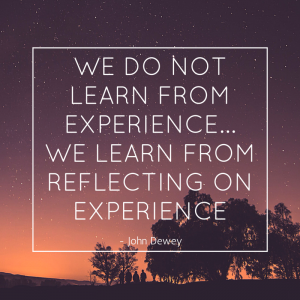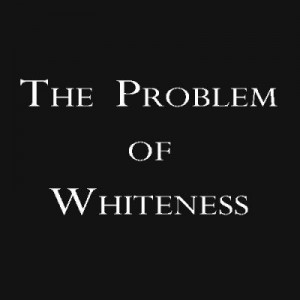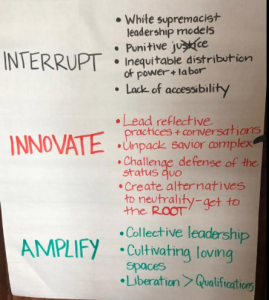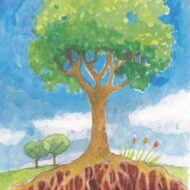 I recently facilitated a session where someone shared in the closing reflections that they felt dehumanized. For anyone to feel dehumanized by my actions is, for me, a fail. When I mess up, it’s imperative for me to own it, learn from the experience, act differently in the future, and make amends as best as I am able. My hope is that this public reflection will help me integrate what I am learning and potentially be valuable for people reading this (as I know I am one of many who carries the identities of a facilitator and a white woman). I am committed to facilitating with integrity and humility. Reflecting in depth on the feedback I receive is an essential part of my commitment. What follows is my perceptions and analysis. I’m sure that there is more to see from the perspective of other people who were present.
I recently facilitated a session where someone shared in the closing reflections that they felt dehumanized. For anyone to feel dehumanized by my actions is, for me, a fail. When I mess up, it’s imperative for me to own it, learn from the experience, act differently in the future, and make amends as best as I am able. My hope is that this public reflection will help me integrate what I am learning and potentially be valuable for people reading this (as I know I am one of many who carries the identities of a facilitator and a white woman). I am committed to facilitating with integrity and humility. Reflecting in depth on the feedback I receive is an essential part of my commitment. What follows is my perceptions and analysis. I’m sure that there is more to see from the perspective of other people who were present.
Perceptions About Power that I had Walking into this Session
When I am facilitating a group, I always hold power in the room. I guide where a group goes or doesn’t go. I hold the actual or symbolic microphone, making decisions about whose voices are heard or not heard. I take up space. I am the center of attention at times. I have influence over what is or isn’t happening in the room. Sometimes I use my power in ways that are contrary to how a person in the room would like the time to be spent. I take very seriously this facilitator’s position of power and influence and strive to use it to make equitable spaces where people are respected and able learn from each other.
 I am a white person and a White Woman. I share these identities with many other people that have historically and still currently hold social power simply because we are white. We act in all kinds of ways, intentionally or unknowingly, that hold us as superior and others as inferior. We have and still do cause trauma and harm towards people of color. Historically (and currently), white folks and White Women had the power of being listened to and believed, our word would be taken as the true word when in relationship with people who did not have as much social power as someone who looks like me. I would be listened to while others weren’t. And many, many folks who looked like me used that power to not only get what we wanted and control other people, but to actually harm other people. When I show up in a room, I am showing up as myself in that moment, and I am also showing up in the image of other people who looked like me and were allowed to be abusive, harmful, and inconsiderate, to name just a few things, towards people who did not look like me.
I am a white person and a White Woman. I share these identities with many other people that have historically and still currently hold social power simply because we are white. We act in all kinds of ways, intentionally or unknowingly, that hold us as superior and others as inferior. We have and still do cause trauma and harm towards people of color. Historically (and currently), white folks and White Women had the power of being listened to and believed, our word would be taken as the true word when in relationship with people who did not have as much social power as someone who looks like me. I would be listened to while others weren’t. And many, many folks who looked like me used that power to not only get what we wanted and control other people, but to actually harm other people. When I show up in a room, I am showing up as myself in that moment, and I am also showing up in the image of other people who looked like me and were allowed to be abusive, harmful, and inconsiderate, to name just a few things, towards people who did not look like me.
When I’m facilitating (and in life), sometimes people will be responding to my direct actions. Sometimes people will be responding to my actions that resemble those of people who looked like me in the past.
Another identity that I can embody is that of a White School Teacher, an archetype that has historically been abusive with its power (along with the education system at large). 80% of teachers in public schools in the United States are white and it is well researched that white teachers and the education system that white folks have created have not been fair, kind, honest, or effective in educating students of color (and some might argue all students).
As a white facilitator, particularly when working in a multi-racial setting, I must be hyper aware of my whiteness and all the ways that I am using or releasing my power and even the ways that those who looked like me have used and abused our power in the past.
What I learned in the Experience I Facilitated
- Knowing all of that above — There was a 15-minute section of time where I forgot that I was white. I was centered on the task of facilitating a process and learning experience. I slipped into the role of a teacher. I used my power as the facilitator to teach the group something that I thought was important for them to learn. I did not realize that when I was the facilitator interrupting participants (an act that felt appropriate for what I was teaching in the moment), I was also a white woman, perhaps a white teacher, interrupting and shutting down people of color — a behavior that is very common for white people to do. In hindsight, I think if I had been holding in my awareness that I was white in that tense moment, I would have used my facilitator power in a way that did not replicate patterns of white folks using our power to oppress and silence people of color. But I forgot that I was white (a privilege and pattern that happens often for us white folks). It was a harsh reminder about how much diligence it takes to consciously disrupt habits of whiteness that are alive in me. I’ve grown up in a world that allows me to not know what it means to be white, but to just exist as “a person.” That ignorance is unacceptable if I am facilitating multi-racial groups and working towards racial justice and healing.
- As a facilitation team, we were teaching something that the group did not give us consent to teach. This is contrary to how I like to operate, how I believe education is effective, and to my own sense of respect for learners. But I did not realize I was living that until it was too late.
- I am reflecting on the wounds people carry from up to 25 years of schooling with white teachers that were abusive with their power. When I am facilitating and “teaching” something, how often might I be summoning up past experiences of trauma or mistrust from the white teachers of someone’s childhood?
- I am also reflecting on — what could it have looked like for someone to interrupt and name the ways my whiteness was showing up and influencing the moment?

What Happened — The Facilitated Experience
A social justice fellowship hired 3 consultants (a multi-racial team) to guide the Fellows (majority people of color) in a process to co-design the rest of their programming and curriculum with an allocated amount of money to work with. We facilitated:
- Pre-session: 1-on-1 interviews
- Session 1: Connecting, understanding the mission, the kind of learning environment that they want to experience and create
- Session 2: Relationships with money, capitalism and collectively shaping a power analysis of what they want to amplify, interrupt and innovate
- Session 3: Collective Decision-making process and begin designing
Session 3 is the session I’m reflecting on here. Our goal was to give the Fellows an overview of a collective decision-making process and then facilitate them through the process, highlighting the process in action along the way so that they could take over the facilitation and facilitate themselves as our contract ended after session 3. In session 1 we asked if anyone had experience with a collective decision-making process. No one raised their hand so we proceeded with the assumption that we would be offering them a process that would be new to them, something for them to experience first hand and then they could choose to use or not use it. We chose a consent-based decision-making process as the tool that we would offer.
Some mistakes that I and we made:
- We did not explicitly get consent from the Fellows to teach them and guide them through the particular consent decision-making process.
- Before we began practicing and using the process, I was assigned the role of explaining the process. We had created a handout and I explained the elements of the handout. My approach was very didactic teaching. In session 1, the majority of the Fellows indicated that they did not like learning in a lecture type environment. At least one Fellow indicated that they did like more traditional teaching styles sometimes. I was not listening to their request to learn by doing, but was instead taking 45 minutes to teach and explain.
- I used my power as the facilitator and the assumptions that I had made that they were open to receiving the process and forced them to participate in the process, at times interrupting an organic flow so that I could fit their organic reactions into the process and highlight for them how to follow the steps. While I knew why I was making those choices, they did not and I think it felt like me inserting my power to control the process in the way I wanted it to go, disregarding their wishes and efforts towards shared leadership.
- When I was using my power as a facilitator to interrupt people while they were talking and connect what they were saying to the process, not only was I forcing participation into something they didn’t consent to, I was also wearing my white skin, in a position of power, and interrupting people of color and exerting my power over people of color.
Some comments made in the closing reflections that particularly stood out to me:
- Over-explaining is a form of Anti-Blackness
- To point out process feels dehumanizing
- Trust us that the work you’ve done is effective and we’ve got this
- It felt like we were being blocked by the facilitation
I apologized for the mistakes I could see in the closing circle and I will continue to listen for ways that I can make amends for any harm that I caused. And, I think the best way for me to repair from these mistakes is to be diligent in myself about not replicating the same mistakes. I know as a white woman, my whiteness will continue to be revealed to me, and my inability to see how I am part of the problem or perpetuating problems will be illuminated. My prayers are that I keep learning, unlearning and embodying my growth and that I cause as little harm as possible. I know that I am on this journey of racial healing and racial justice for the long haul and I pray that I show up with humility and integrity, contributing in places where my presence is of value and is not a disruption to healing and justice.
P.s. This article was shared with me as a follow-up to this group: Consensus is a means, not an end.
